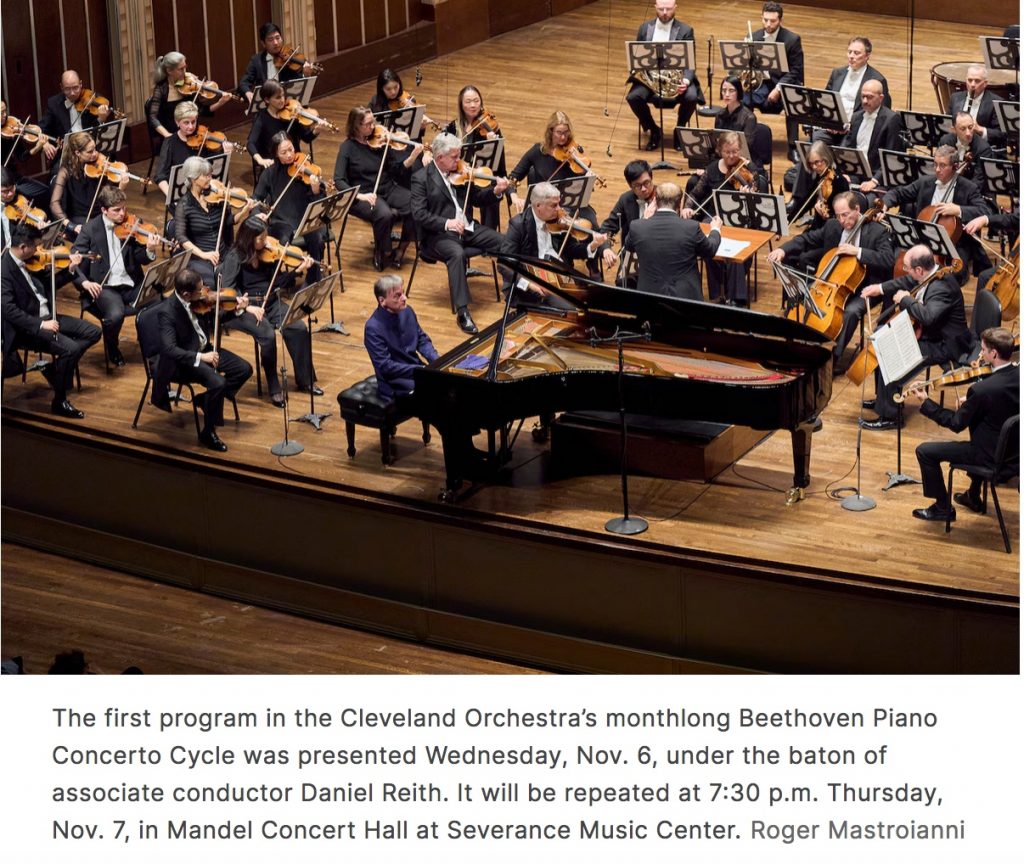by Kevin McLaughlin

CLEVELAND, Ohio — A relaxed understanding born of a long career helped pianist Garrick Ohlsson bring easy grace and Proto-Romantic sensibility to Beethoven’s Second and Fourth Piano Concertos with the Cleveland Orchestra.
The program on Saturday at Severance Music Center featured early and middle works, the second set of concerts in the Orchestra’s cycle of Beethoven piano concertos.
Despite its number, the Second Concerto is actually the composer’s first, begun in 1790. Ohlsson treated this early Beethoven work expressively, with sinuous rubato, keeping his rhythms precise, his touch light, and his rhetoric clear. Nothing, not even Beethoven’s many technical snares, seemed to faze him.
And the pianist rarely pulled rank: every phrase seemed agreed upon rather than dictated to the Orchestra. Ohlsson’s many dialogues with individual players — woodwinds, for example — were deft, sometimes voluntarily retreating into the background. His ability to change his articulation from assertive to dreamy furthered both his and Beethoven’s cause.
Conductor Daniel Reith guided the orchestra with steadiness and buoyancy. In the second movement, strings and winds combined for astonishing elegiac moments, and in the finale, Ohlsson led the band in a rollicking rondo, revealing every syncopation and surprise. It was enough to prompt immediate and heartfelt applause
If you thought the Second could not be topped, the expansive Fourth Concerto in G after intermission rewarded those who believed otherwise.
The Fourth begins with G major chords from the soloist — a startling gesture, as pre-concert lecturer David Rothenberg reminded us — to which the Orchestra responds a major third away in B major, a move every bit as bold. Eschewing flamboyance, Ohlsson focused on nuanced shaping of each phrase, sometimes leaning into powerful, muscular chords which gave way to pearly trills and elegant arpeggios.
The drama of the middle movement was so arresting it was hard not to hear it as “Orpheus taming the Furies” — a scene suggested by some to have been borrowed from Gluck’s opera Orfeo. (That’s a scene Beethoven would have known well, even if he didn’t explicitly reference it in the score). With Ohlsson’s delicate wisps of chords against the Orchestra’s ominous interjections, seldom have we heard this music sound so vivid or theatrical.
The lively finale featured playing as daring as it was joyous. Ohlsson and the Orchestra infused this concerto — one of the Cleveland cycle’s more audacious — with a freshness that made the experience feel new. Exemplary audience behavior (no latecomers, few coughing fits) was rewarded with another Beethoven gem: the well-loved second movement of the “Pathétique” Sonata, op. 15.
The Cleveland Orchestra repeats this program on Tuesday at 7:30 p.m. The Beethoven Concerto Cycle continues on Friday at 7:30 p.m., Saturday at 8 p.m. and Sunday at 3 p.m. — with Concertos Nos. 1 & 5 with Daniel Reith conducting, and pianists Minsoo Sohn (First Concerto) and Yunchan Lim (Fifth Concerto).
Published on ClevelandClassical.com November 14, 2024.
Click here for a printable copy of this article


